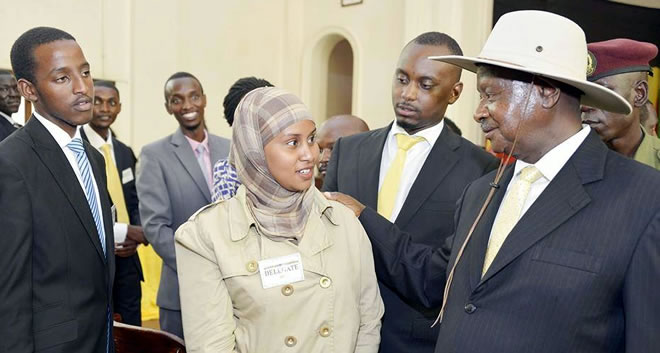
Shukri A. Islow with Uganda President Yoweri Museveni - Kampala, Uganda
by YUSUF SERUNKUMA
Wednesday, October 22, 2014
As I write this piece, my teacher and friend, Shukri Ahmed Islow, is back to Mogadishu after twelve years of wandering the region for a home – six were in Uganda.
“Let me go and die home than scavenge here. We are no longer welcome here [in Uganda],” she decidedly announced as we talked.
Although many Somalis dream of returning home, her decision was not prompted by the desire to return to a supposedly-peaceful Somalia and take part in its reconstruction. It followed September’s well-publicised anti-terrorism swoops in downtown Kampala, in which around 30 people were detained for allegedly “aiding and abetting terrorism and belonging to a terrorist group.”
Shukri was not detained. Neither was any of her family. But like in Kenya, the arrests profiled her [and all Somalis in the region], not just as Somalis, but also as potential terrorists, criminals, and proven security threats. Because these arrests are in the public interest, it should be striking that ‘public interest’ appears to exclude Somalis.
Hounded by the al-Shabab and other warlords at home, many Somalis continue to live under physical and psychological persecution, rising social stigma and ‘Islamophobic’ stereotyping in the region. Of course, no one condones terrorism in any form. But at risk of being branded terrorist sympathisers, we should ask questions about this otherwise-conspicuous practice of othering, stereotyping and then criminalising.
Ugandan media reports on how the September arrests played out exhibit an illuminatingly scaring pattern: On September 18, New Vision reported that operations in Nateete – one of Kampala’s suburbs –were carried out “after local authorities reported a recent influx of Somali nationals.”
It also noted that, “most of the suspects were holding dual citizenships [determined, perhaps by holding two passports] or claiming refugee status.” On September 19, another arrest was reported in eastern Uganda, coming after a tip-off from a guesthouse that reported “unusual” behaviour of its clients: “They kept mostly to their rooms,” and “spent most of the time making phone calls and talking in Kiswahili.”
On October 8, describing Somalis in the dock, media pointed out their “unkempt hair and bushy beards.” The women were “dressed in hijab and veiled.” By implication, the above is the outward image of a potential terrorist. Indeed, these media/intelligence portrayals, their benign passiveness notwithstanding [are they not deliberate?], have stereotyped the entire Somali community in the region.
And this is neither ignorance nor coincidence. If anyone sought to understand Somalis’ lived reality, keeping unkempt hair [as we tend to judge them using a Ugandan standard], spending a lot of the time on their phones (majority Somalis use Orange lines for free talk – and Somalis are baroque conversationists –they will realise that it is just the Somali way.
One cannot understand the sheer hypocrisy behind claims that possessing multiple travel documents is evidence for potential criminal behaviour – especially in the Somali context. Because of the over two-decade conflict, the present Somali state controls about 10 per cent of the country, too small to monitor all outside travel.
Indeed, with the exception of a few countries in the region, Somalia or Somaliland passports are not recognised across the world. This has forced both criminal and law-abiding Somalis into forgery of travel documents. If our intelligence agencies studied or searched bags of Somalis visiting the country, many will have these documents in their bags to display when convenient.
Do our intelligence agencies know this? Of course yes. What then explains this cynical turnaround?
With the known strength of Somali filial relations – as Shukri shared with me – it is rare for any Somali outside Somalia to be without a brother, sister, cousin, nephew, uncle, clan-relative, et cetera, within the ranks of al-Shabab. These near and distant al-Shababi relations will often call to say hello and ask about a new born or deceased relative.
Does that make you an al-Shabab? Why would receiving a call from a Somali relative in al-Shabab be evidence for culpability? Frankly, the general sense of alarm created by our intelligence bureaus and dramatised by media points to an awful lack of sophistication in the fight against terrorism, and supposedly different agenda.
Why would an intelligence officer argue that they lack “trusted and competent interpreters” for quick interrogation? So, if all Somali have al-Shababi blood – neither of them can be trusted! Shukri reminded me, she was only Somali – and a Muslim.
The author is a graduate fellow at Makerere University.